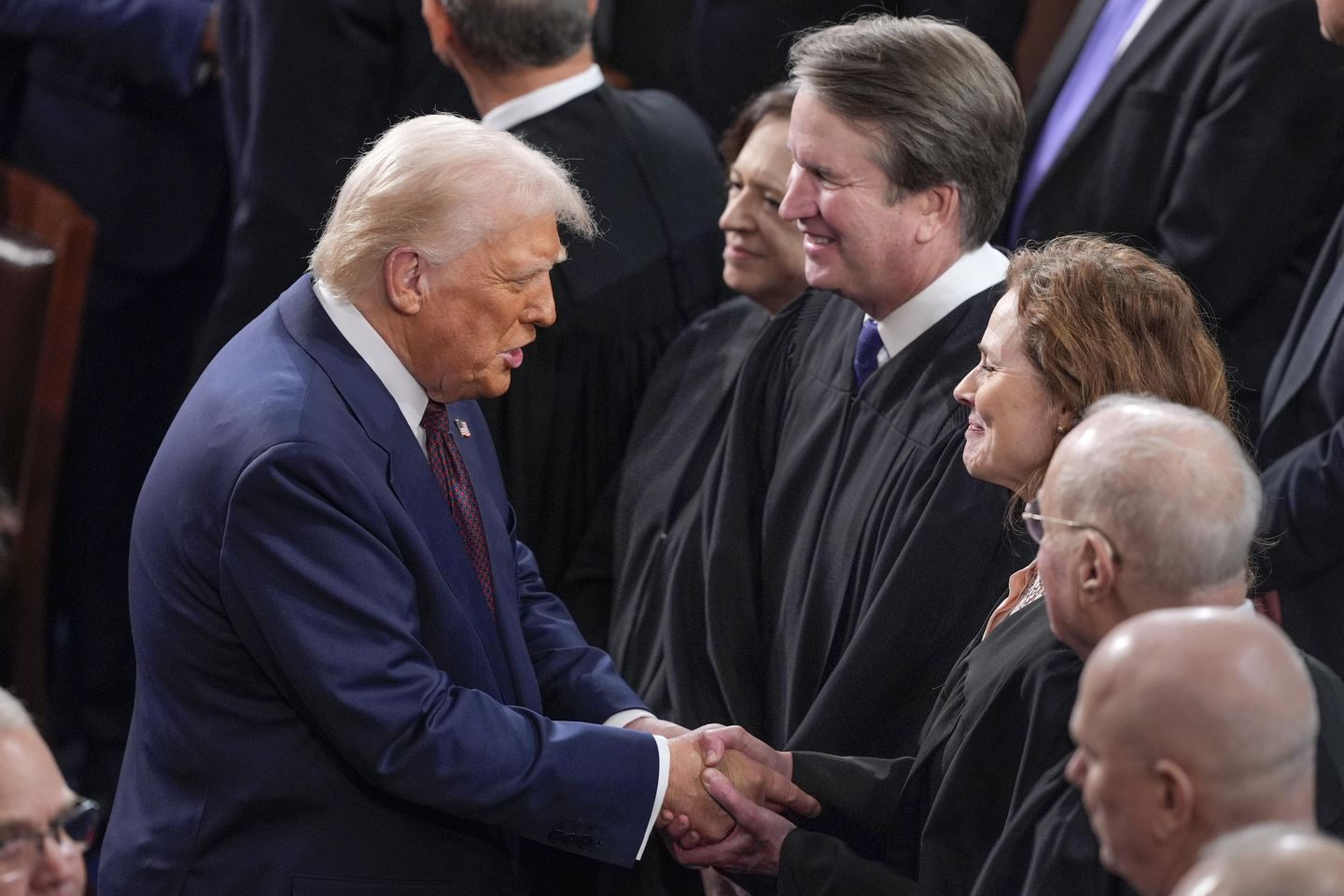
President Trump lashed out at the Supreme Court after it blocked him from using antiterrorism powers under the Alien Enemies Act to make further deportations. He pleaded with the justices to “come to the rescue of America.”
The high court ruled Friday that Mr. Trump’s team was shortchanging illegal immigrants’ “due process” rights by not giving them enough time to challenge impending deportations in federal courts.
The justices paused deportations and ordered lower courts to determine how much time the illegal immigrants should be given.
They said the migrants should have more than the one day that the Trump administration suggested and that the administration must tell the deportation targets how to sue.
“Under these circumstances, notice roughly 24 hours before removal, devoid of information about how to exercise due process rights to contest that removal, surely does not pass muster,” the court said in an unsigned opinion.
In a social media blitz over the weekend, Mr. Trump reposted a series of attacks on the decision by Mike Davis, a former Supreme Court clerk and now head of the Article III Project, who said the justices were “heading down a perilous path.”
“Let’s get this straight: Obama can drone [strike] Americans. But Trump can’t repel foreign terrorists. Biden can import over 10 million illegal aliens. But Trump can’t send them home without years of court process. The American people never agreed to this,” Mr. Davis said.
In another post that Mr. Trump promoted, Mr. Davis urged the president to “house these terrorists near the Chevy Chase Country Club, with daytime release.”
Chevy Chase is a wealthy neighborhood on the border of Maryland and the District of Columbia, long known as the home of high government officials, including Chief Justice John G. Roberts Jr. and Justice Brett M. Kavanaugh.
“The Supreme Court must come to the rescue of America,” Mr. Trump wrote.
At issue are Venezuelans who Mr. Trump says are members of Tren de Aragua, a gang that the government has declared a foreign terrorist organization. Mr. Trump said the gang is engaged in an “invasion” or “predatory incursion” into the U.S.
He used those decisions to invoke the Alien Enemies Act, a 1798 law that allows for faster deportations than would usually occur under immigration law.
Mr. Trump used that power to send more than 200 Venezuelans to El Salvador in March, in three controversial flights that ignited a tsunami of litigation.
The justices said Mr. Trump can deport the Venezuelans under regular immigration law but cannot use the Alien Enemies Act until the courts determine what rights the migrants are due.
They said they had yet to rule on whether Mr. Trump’s invocation of the Alien Enemies Act is proper and suggested they may block him altogether in a future case.
Justices Samuel A. Alito Jr. and Clarence Thomas dissented from Friday’s decision. They said the court lacked jurisdiction to get involved.
“From the court’s order, it is not entirely clear whether the court has silently decided issues that go beyond the question of interim relief. (I certainly hope that it has not.) But if it has done so, today’s order is doubly extraordinary,” Justice Alito wrote.
“Granting certiorari before a court of appeals has entered a judgment is a sharp departure from usual practice,” he said.
His opinion also questioned the high court’s insistence on due process rights for the illegal immigrants.
“Due process is flexible, we have stressed repeatedly, and it calls for such procedural protections as the particular situation demands,” Justice Alito wrote.
Attorneys for the Venezuelans dispute the claims of Tren de Aragua membership. They said some deportees fled Venezuela to distance themselves from the gang.
Venezuelans must have a chance to make that argument in court before they can be deported under the Alien Enemies Act, the attorneys said.
“The use of a wartime authority during peacetime, without even affording due process, raises issues of profound importance,” said Lee Gelernt, a lawyer with the American Civil Liberties Union who has battled the administration over deportations.
He called the court’s ruling “a powerful rebuke” to the administration.
As part of the March flights to El Salvador, the administration also ousted dozens of Salvadorans who the government said were part of MS-13, another international gang that the U.S. had designated a terrorist organization.
One of those was Kilmar Abrego Garcia, who was arrested by immigration officers in Maryland just days before he was deported.
U.S. District Judge Paula Xinis, who has been working to return Mr. Abrego Garcia, unleashed a new fusillade of criticism on the government Friday. She questioned whether the Trump administration was showing good faith.
She said it was tough to reconcile government attorneys’ assurances with Mr. Trump’s and Homeland Security Secretary Kristi Noem’s remarks that Mr. Abrego Garcia would not be returning.
“You’ve done nothing, and now you tell the world you’re not going to do anything,” Judge Xinis told the Justice Department in a hearing Friday.
The White House said El Salvador won’t release Mr. Abrego Garcia. Mr. Trump said he could bring back the Salvadoran but didn’t see a need to, and was deferring to his aides.
Ms. Noem testified on Capitol Hill this month that Mr. Abrego Garcia wouldn’t be allowed to return.
“That sounds to me like an admission of your client that your client will not take steps to facilitate the return,” Judge Xinis said.












